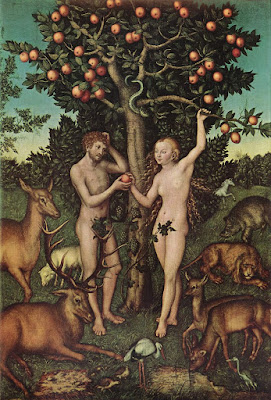Reading notes: Adams and Eve
I enjoyed the detail in Ginzburg's "The Ideal Man" about how Adam had unique wisdom to name all the creatures on Earth. He named himself, God, and all the animals. I could write a story focusing on Adam's names for specific animals — why does the name "ox" fit an "ox?" How did the names come to him? Writing from a first-person perspective could be an interesting twist on this story. It was interesting that Satan's test of wisdom was seeing if he could name animals more accurately than Adam, and how that led to his fall.
I also liked the detail about how Adam gave 70 of his 1000 allotted years of life to David. It would be interesting to write about a modern-day world where you could grant others your years or minutes of life if they needed more time.
I enjoyed learning about Lilith — Adam's first wife, before Eve. I thought it was interesting how she was used as an anti-Eve in the story, and how the different ways God created them made Lilith incompatible and Eve compatible with Adam. It would be interesting to write about Adam and Eve from Lilith's scorned perspective. It was also interesting to me how the story uses Eve to explain a patriarchal society and common stereotypes about women, since a lot of those values are less and less revered today.
I thought the part about the malham bird in Ginzburg's version of "The Fall of Man" was interesting. It could be neat to examine where else in mythology the malham or its equivalent (a phoenix) appear.
The detail about Adam's stature shrinking after he ate the forbidden fruit stood out to me, too. That's not a part of the Genesis story that I remember, but it helps to explain why humans are generally the size we are.
Bibliography: "Adam and Eve," stories from Genesis, Ginzburg and Stories of Adam and Eve. Web source: Class reading page.
I also liked the detail about how Adam gave 70 of his 1000 allotted years of life to David. It would be interesting to write about a modern-day world where you could grant others your years or minutes of life if they needed more time.
I enjoyed learning about Lilith — Adam's first wife, before Eve. I thought it was interesting how she was used as an anti-Eve in the story, and how the different ways God created them made Lilith incompatible and Eve compatible with Adam. It would be interesting to write about Adam and Eve from Lilith's scorned perspective. It was also interesting to me how the story uses Eve to explain a patriarchal society and common stereotypes about women, since a lot of those values are less and less revered today.
I thought the part about the malham bird in Ginzburg's version of "The Fall of Man" was interesting. It could be neat to examine where else in mythology the malham or its equivalent (a phoenix) appear.
The detail about Adam's stature shrinking after he ate the forbidden fruit stood out to me, too. That's not a part of the Genesis story that I remember, but it helps to explain why humans are generally the size we are.
 |
| Adam and Eve with the serpent in the tree. Source: Wikimedia Commons |
Bibliography: "Adam and Eve," stories from Genesis, Ginzburg and Stories of Adam and Eve. Web source: Class reading page.


Comments
Post a Comment